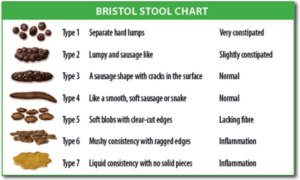Chronic constipation is really uncomfortable.
It’s also a sign that something needs your attention. Getting rid of waste products every day is a very important part of gut health and therefore overall optimal health.
Humans were meant to have several bowel movements each day, so if this process is dysfunctional, a variety of health problems can persist.
Normal bowel movements are soft, sausage shaped stools that are light brown to dark brown in color. (see chart below). Colorful foods like dark leafy greens or red beets can also influence the color. Stools that are small, hard lumps that are difficult to pass are a sign of constipation. If this happens only once in a while it can be due to dehydration, stress or dietary changes.
If this type of stool is a regular occurrence, read on. Left untreated, ongoing constipation can lead to hemorrhoids, fecal impaction, diverticulosis, accumulation of waste products or other health issues that are based on a less-than-optimal diet and poor elimination.
The formula for normal elimination is a combination of relaxed, healthy eating, adequate fiber and water, and balanced numbers of beneficial microbes.

Fiber – Fiber is an indigestible form of carbohydrate, or you can call it “roughage.” It acts like a scrub brush that attracts water into the intestines and helps form bulky stools that are easier to pass. If your diet is mostly refined starches, meats, and fats, there is not enough bulk to create soft stools that promote easy elimination. Adults need about 25-35 grams (depending on age and gender) of fiber every day from foods.
Fiber supplements – Supplements like Metamucil or psyllium husk powder can be useful on occasion, but don’t supply a rich variety of nutrients that help improve diet quality. Relying on fiber supplements long term is short-changing you from getting better nutrition found in real food.
Water intake – If you are increasing fiber then the most important thing to do is to also increase water at the same time. If you are not drinking enough water, this alone will cause the stools to be hard and dry and difficult to pass. Drinking 16 oz of water first thing in morning (ideally before 9am), and 16-32 ounces between meals is a good plan. The average adult needs about 8-10 cups of water per day depending on activity levels and weight. Adjust the temperature of the water to meet your needs. If you have sensitive digestion, make the water warm to drink, especially first thing in the morning. Warm water or tea will be more relaxing to the stomach and intestines.
Food – Foods are the best source of fiber and nutrients to improve digestive function. Below are some suggestions for dietary approaches. Only plant foods contain fiber. Animal foods like meat, fish, eggs, or cheese do not contain fiber.
- Fruit: Eat 2-3 cups of whole fruit each day. Apples, oranges, bananas, pears, pineapple, figs, plums, peaches all are good choices. The skin of the fruit will have the most fiber so leave these on when appropriate (like apples, peaches and pears).
- Whole intact grains are those that have not been processed in any way. Whole brown rice, quinoa, buckwheat, millet, sorghum, wheat berries or oats contain about 4-6 grams of fiber per serving.
- Beans are a fiber powerhouse as they contain 3-6g per ½ cup! Ideally about 1 cup per day is optimal if you are eating meats and fish, or 2-3 cups per day if you are vegetarian.
- Nuts and seeds: Chia seeds and flax seeds have the most fiber and can be ground finely and added to baked goods, cereals, oatmeal, smoothies or salads. Other nuts and seeds or nut butters have plenty of fiber too!
Beneficial Bacteria that live in and on our bodies are essential for good health. These organisms have many functions:
- Protect us by helping to out-compete disease causing bacteria and stimulating the immune system
- Consume the indigestible fibers we eat and helping to break down our food
- Make substances that nourish our intestinal cells and our nervous system.
- Produce vitamin K2, biotin (a b-vitamin) and short chain fatty acids
- Enable optimal brain development and influence behavior
Cultivating a range of “good bacteria” starts with a healthy diet high in fiber – aka, plant foods. Plant foods like fruit, vegetables, beans, grains and nuts provide food for the beneficial bacteria. Refined starches, processed foods and sugar feed the types of bacteria that are often not beneficial.
What you eat determines which types thrive in your body. In turn, chronic constipation may be influenced in a positive or negative manner by the organisms that are most dominant. Our health history with antibiotics, drinking chlorinated water, stress, childbirth, use of antibacterial soaps, foods eaten all influence the development of our microbiome (bacteria in our body.)
Eating some raw fruits and vegetables and fermented foods and taking probiotic supplements may all play a role in the building of a healthy microbiome.
Exercise – Movement assists with the flow of blood, lymph, oxygen, and helps mobilize the intestinal tract. Taking a gentle walk after a meal or doing more vigorous exercise between meals is the best way to encourage better digestion and elimination.
Toilet ergonomics—You often hear about travelers who have been abroad and encounter the squat toilets which look like a hole in the floor where the toilet should be. While these may not be ideal for everyone, squatting is the best position for elimination. Squatting uses gravity and alignment to allow defecation to happen without having to strain or push the internal abdominal muscles. Handicap toilets are quite tall and are a safe option for a person with mobility problems, but often make it more difficult to eliminate easily.
If the heels of your feet do not touch the floor of your toilet at home, consider a Squatty Potty. This is a plastic foot rest that with which you can prop up your feet and knees when you sit on the toilet. It mimics the position of squatting somewhat and can make bathroom time more effective. We carry these in the Table Market if you want to come check it out!
Laxatives are sometimes necessary but regular use can create dependence on them. This is not ideal. In fact, overuse can lead to further problems, mineral deficiencies, dehydration, or they can cause the intestines to lose nerve and muscle response and perpetuate the problem further.
Natural laxatives:
- 16 oz water first thing in the morning…wait 30 minutes. Then drink 12- 16 oz fresh celery juice.
- 100-300 mg magnesium citrate taken with water before bed at night
- Coffee can have laxative effects
- 4-8 oz aloe vera juice (bottled) on an empty stomach or fresh aloe gel mixed into a smoothie (cut a 2 inch piece of aloe leaf in half horizontally and scrape out the gel)
Action plan for better elimination
- Keep a food diary and look at your diet as a whole. If you see a lot of dry, crunchy foods like bread, cereal, granola bars and crackers, consider adding in more moisture: soups, stews, salads, steamed vegetables, fresh fruit.
- Use a nutrient tracker like My Fitness Pal to track fiber and water intake for 5 days. If your daily average fiber intake comes in below 30 grams per day, then you need to add more fibrous foods and whole fruit to your meals.
- Water water water! If you increase your fiber, be sure to increase your water intake. Fill two quart jars and make sure you have consumed a minimum of 8 cups of water each day.
- Get exercise every day. Walking, biking, chasing your kids at the park, vacuuming your basement, etc.
- Foods to eat generously are large green salads, hummus, bean soup, bean burritos, brown rice or quinoa pilaf, oatmeal with blueberries and ground flaxseeds, fruit smoothie with chia seeds, whole fruit, or a vegetable stir fry with edamame.
If dietary or hydration measures are not helpful, see your physician as there can be more serious underlying GI tract or gut health causes, intestinal blockage, autonomic nerve damage, neurological diseases, diabetes, thyroid disease, or pelvic floor dysfunction.
As always, we are here to help support you in your wellness journey. If you are struggling with constipation, please make an appointment to work with one of our providers for more guidance.
If there are other hidden causes of constipation like microbial imbalance, prescription medications or supplements, lack of digestive enzymes, motility problems, IBS, or other illness, we can help.
Photo by Anna Shvets from Pexels
Sources:
Andrews CN, Storr M. The pathophysiology of chronic constipation. Can J Gastroenterol. 2011;25 https://www.ncbi.nlm.nih.gov/pmc/articles/PMC3206564/pdf/cjg25016b.pdf
Dreher ML. Whole Fruits and Fruit Fiber Emerging Health Effects. Nutrients. 2018;10(12):1833
https://www.ncbi.nlm.nih.gov/pmc/articles/PMC6315720/
Dinan, TG; Stilling R; Stanton C; Cryan JF; Collective unconscious: How gut microbes shape human behavior 2015
https://www.sciencedirect.com/science/article/abs/pii/S0022395615000655
Ohkusa T, Koido S, Nishikawa Y, Sato N. Gut Microbiota and Chronic Constipation: A Review and Update. Front Med (Lausanne). 2019;6:19. Published 2019 Feb 12. https://www.ncbi.nlm.nih.gov/pmc/articles/PMC6379309/
